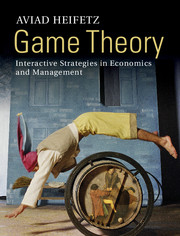Book contents
- Frontmatter
- Contents
- Foreword
- Part I Strategic interactions as games
- Part II Basic solution concepts for strategic form games
- Part III Prominent classes of strategic form games
- Part IV Uncertainty and mixed strategies
- Part V Advanced topics in strategic form games
- 14 Rationalizable strategies
- 15 Stability of equilibria
- 16 Games and evolution
- 17 Global games
- Part VI Dynamic games
- Part VII Repeated games
- Index
- References
16 - Games and evolution
from Part V - Advanced topics in strategic form games
Published online by Cambridge University Press: 05 August 2012
- Frontmatter
- Contents
- Foreword
- Part I Strategic interactions as games
- Part II Basic solution concepts for strategic form games
- Part III Prominent classes of strategic form games
- Part IV Uncertainty and mixed strategies
- Part V Advanced topics in strategic form games
- 14 Rationalizable strategies
- 15 Stability of equilibria
- 16 Games and evolution
- 17 Global games
- Part VI Dynamic games
- Part VII Repeated games
- Index
- References
Summary
The solution concepts we have dealt with so far were based on the assumption that the players taking part in the game are rational. Is game theory useful only under the assumption of rationality?
It may perhaps be surprising to discover that the answer to this question is negative. In this chapter, we will replace the assumption of rationality by which the players try to maximize their payoff with an assumption that is the very antithesis of rationality. We will assume that every player is devoid of the capacity to choose, being pre-programmed to play a unique particular strategy.
How can a theory of strategic choice be relevant for players who make no choice? Despite the apparent contradiction, we will see how the tools of game theory can serve for analyzing the evolution of characteristic properties or types of individuals in large populations. The fascinating connection between game theory and biology was explicitly proposed by Maynard Smith and Price (1973) and was later developed in the classic book of Maynard Smith (1982).
In population games, a player’s strategy is its type. In an animal population, the player is an individual in the population and its type is a genetic property that it bears – its genotype. This is a property that it inherits from its parents and bequeaths to its offspring. This idea can also be extended to a discussion of social and cultural norms in human societies: an individual’s type may be a social norm that the individual has assimilated and internalized in the course of the socialization process and which she will also bequeath to her children.
In the games we dealt with in the preceding chapters, the participants in the strategic encounter always constituted a constant (and usually small) set of players, and the encounter between them was a one-shot non-recurring interaction. In population games, by contrast, the encounters take place over and over again between pairs of individuals chosen in each encounter by random pairwise matching.
In any random encounter in the course of a population game, the individuals do not perform any process of choice; the payoff of each individual is determined by the profile of the types of individuals in the encounter. What, then, does this payoff express? If the individual makes no choice, what significance is there to the fact that the individual would have obtained a higher payoff had it been of a different type?
- Type
- Chapter
- Information
- Game TheoryInteractive Strategies in Economics and Management, pp. 259 - 283Publisher: Cambridge University PressPrint publication year: 2012



